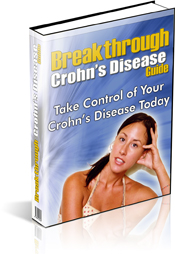Men and women and older children are often victims of Crohn’s Disease. What causes Crohn's? The jury is still out on that, medical science does not yet have the answer.
Of great concern to anyone suffering from Crohn's Disease (and other Inflammatory Bowel Diseases) is that a major symptom of the condition is a vitamin D deficiency.
 |
Vitamin D helps regulate the amount and the use of calcium and phosphorus (maintaining your bones) in your body. It may also help prevent high blood pressure, some cancers and has other health benefits.
There are two ways you get vitamin D into your body. By eating foods that contain the fat-soluble vitamin and through exposure to the sun. Your skin is able to manufacture Vitamin D using sunlight.
If you don’t get enough vitamin D in your system, one result is osteomalacia which means your bones are weaker than they should be. In children, this is called rickets and in all age groups, osteomalacia means that you can very easily fracture your bones. One of the reason older people more easily experience broken bones and fractures is that they are not able to produce or absorb Vitamin D as they did when they were younger. Anyone over the age of 50 may want to consider taking Vitamin D supplements. And, of course, those with Crohn's at any age should look into Vitamin D supplements.
If you add vitamin D supplements to your diet and spend more time in the sun, you drastically improve the levels of vitamin D your body needs to prevent osteomalacia.
Vitamin D supplements are usually not classified as drugs and can therefore be purchased over the counter at a pharmacy or health food or whole food store. However, just because they are not technically drugs doesn’t mean you shouldn’t use precaution when taking these supplements.
First, ask a doctor if it is safe for you to take vitamin D supplements. Because of your Crohn’s Disease, you are probably taking other daily medications. Sometimes, a supplement can interact with or decrease the potency of other things your taking.
You should also ask your doctor how much you should be taking every day. Too much vitamin D can be serious and lead to vitamin poisoning. This can cause problems with your kidneys and liver. At some point, you may want to have the Vitamin D levels in your body tested as feedback to how much you need to take.
Crohn’s Disease is not a fun medical condition with which to live. Making sure you have enough vitamin D in your system can make life easier. Talk to your doctor about making vitamin D supplements, a part of your battle against Crohn’s Disease and for improving your overall health.
If you are ready to Discover How You Can Join The Others Who Have Learned Techniques To Be Free from The Agony of Crohn's... Eat Without Discomfort... And Live Without the Constant Pain, then get the: Breakthrough Crohns Disease Guide.
